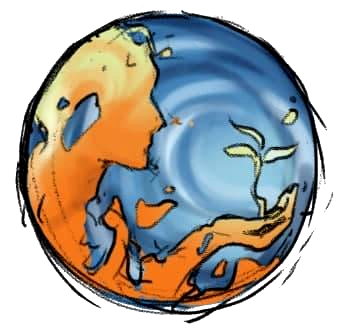A Brief Agenda for the Next Renaissance
A Brief Agenda for the Next Renaissance
Opinion on the elements that can and will fit together to provide economic, social, environmental transition that will open a potential path to regenerative systems.
In the most consequential era since the Renaissance, humanity faces a profound transformation in which our future hangs between the limitless potential of knowledge-driven transformation and a precipice of environmental and social collapse delivered by our own actions. Citizens, governments, businesses, and philanthropists must mobilise around a new narrative for humanity that fully integrates complementary responses to these trends. Such a narrative must be animated by human purpose in bringing about ecological and social regeneration, shared abundance, and the prosperity that is now possible.
Lazy thinking from the world’s leaders and fascination with our own creations have led to a dangerous appreciation of our moment in history. At risk is the way of life that many in developed countries expect, and to which those in developing countries aspire. Without action, humans can expect cascading climate-related impacts on natural systems that will carry over and overwhelm human systems. Amplifying this challenge is the technological and economic revolution that is of a different kind than our 20th Century economics and systems of governance were designed to manage. In turn, this has led to eroding governance, challenges to long-held social norms, and increasing instability. A risk and an opportunity, this is a moment that must be turned to advantage through conscious leadership.
Lulled by bromides: we have experienced climate change and species loss before — it’s natural. We’ve been through “industrial revolutions” and the fourth one is going to be better now that business has found new purpose in “stakeholder capitalism”. We are uneasy but hope that re-skilling will solve the challenges of technological displacement, and of course, no machine will replace human creation, love, or compassion.
Don’t count on it.
Equally misguided, well-meaning critics point to “growth” as the root cause of environmental destruction and human inequity. As practiced over the last two centuries, the resource-intensive, managed “externalities” model is no longer viable. “Sustainable development” has moved us in the right direction, but it is no longer sustainable. We must now design for ecologically and economically regenerative growth. This means measuring our plans and actions against metrics that demonstrate that we are enriching, not extracting, from our communities and natural ecosystems.
Such growth is possible today because the nature of “growth” itself has changed. Services, intangible assets, and knowledge-intensive tools and systems are rapidly displacing materials as the drivers of economic value, and this shift is accelerating. Unlike in previous eras, the growth potential in this emerging dynamic is limitless and naturally less material-intensive.
Such innovation is already being applied to solve longstanding challenges including renewable energy and the synthesis of food and live tissue, among others. With intention and design, broader societal support for innovation that exploits this dynamic could have a great positive, transformative impact.
Because this emerging economic dynamic does not hold to the historical rules regarding development and growth, particularly its intangible nature, it could be called the “Quantum Economy” reflecting, as in physics, the belief-defying properties of atoms to exist in two states at the same time. Such a dynamic applied to social and economic evolution holds out the promise of overcoming the most fundamental constraints of human existence such as hunger, health, energy, and more.
But transcending the physical bounds of human existence is not enough. It must be matched by a corresponding shift in societal values, economic approaches, and governance if we are to realise the abundance implicit in such changes.
A core challenge in the Renaissance was not just managing the new inventions, but reconsidering the role of human agency, creativity, innovation, choice, and the corresponding social architecture that promotes societal wellbeing. Ethics and philosophy must play a leading role in this future: the meaning of human existence is in play. How we define ourselves and our social systems is up for debate, including the role of work, jobs and “labour”, the role of markets and regulation, and the value and role of international cooperation.
A new narrative that ties together ethical, economic, environmental, political, and cultural dimensions is needed. Many pioneering thinkers and entrepreneurs are taking such changes into account and identifying strategies for regenerative societies: how markets can better advance innovation and equity; how to re-balance social representation and civic participation; and how to manage, measure, and regulate economies built first on the inexhaustible resource of human knowledge.
Within communities and nations, and across international borders, new approaches must be cultivated from the ground up. An ethos of common cause in domestic and international relations must propel the redesign of political and economic governance to match the speed of the new economy while retaining integrity, ensuring distributive justice, and putting the quality of human life and the well-being of Earth at the centre of policy making.
In business, a growing number of visionary and risk-tolerant entrepreneurs see potential in a new narrative and are turning it into economic opportunity. A dramatic rush into new sectors like meat alternatives and new hybrid ventures that meld mutually reinforcing financial, environmental, and social innovations is taking place. These include alliances to restore forests and repopulate mangroves in a way that reinforces healthy human and natural ecosystems while generating financial returns. Efforts to create business models and markets that pull regenerative practices forward must be a major focus of this future narrative. Experimentation that incorporates such principles must be promoted and proliferate.
Tackling these problems will require a revised understanding of economic value and competitiveness and the determinants of a thriving society as well as the social and regulatory frameworks needed to manage them. We will need pioneers to form the groundwork for these emerging systems and cultivate the next generation of leaders. This includes those who help to reset the ethical and philosophical grounding of the new agendas, and future-oriented think tanks to act as trusted knowledge sources and partners in multi-stakeholder collaboration.
Apathy brought on by a crisis of representation must be tackled head-on. Citizen engagement and the ability to find new forms of deliberation and participation as well as new tools of “movement” that can ignite collective action will be needed.
Existing intellectual property regimes are not generating adequate innovation or the societal benefits we need in the emerging economy. Resetting societal approaches to shared knowledge such that they maximise innovation, social well-being, and inclusion and while respecting the needs of creators must be a priority.
Policymakers must leverage and extend investment opportunities and regulate to re-balance Earth systems. In the context of the emerging Quantum Economy this means supporting the creation of flourishing business ecosystems that incubate innovation, particularly for micro, small and medium sized businesses. The entities that are capable of investing in future markets must help to define the needs of such markets while supporting government efforts to invest in and create an enabling regulatory environment that promotes them in a way that is consistent with economic and ecological welfare.
There is also a unique role for philanthropy: risk-capital that shifts public understanding and enables citizens, governments, and business to make the future market-ready is essential. Although essential, philanthropic capital alone will be inadequate: it must crowd in public and private investment. Such action must take place in the context of a coordinated effort to generate a new narrative of purpose and a broad supply of use cases that brings public attention and additional investment to the table.
The Renaissance was at its core a transformation that grew out of the question “Who are we?” Driven, brave innovators answered this call through art and scientific method that re-positioned humanity, with agency, at the centre of its own destiny.
This Next Renaissance calls for prolific investment in the ethical, political, and market-based systems that will form the basis of our transformation. Such investment must support innovators and trigger growth that leads to catalytic change in each of these domains.
Who better to take on this task than those conscious leaders gathered around a fire of purpose, with knowledge in the service of humanity at the centre of this Next Renaissance?

